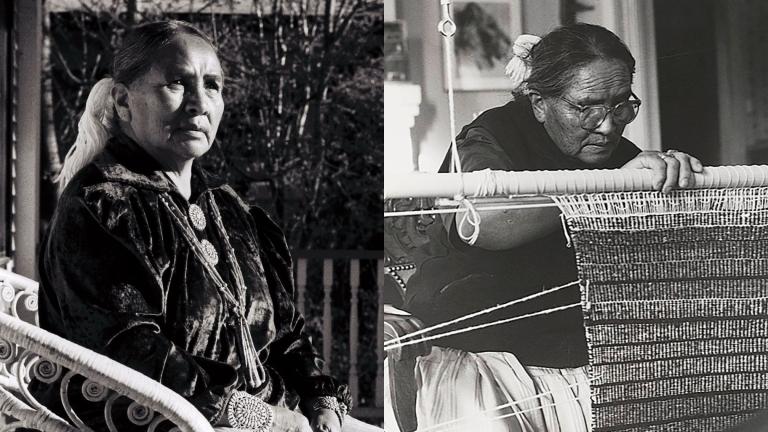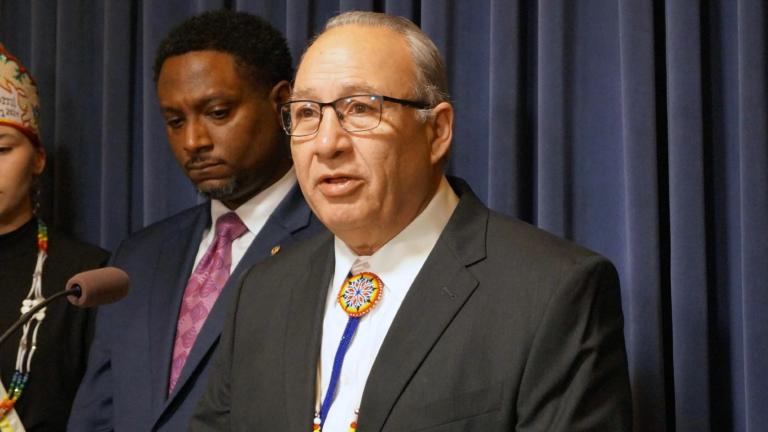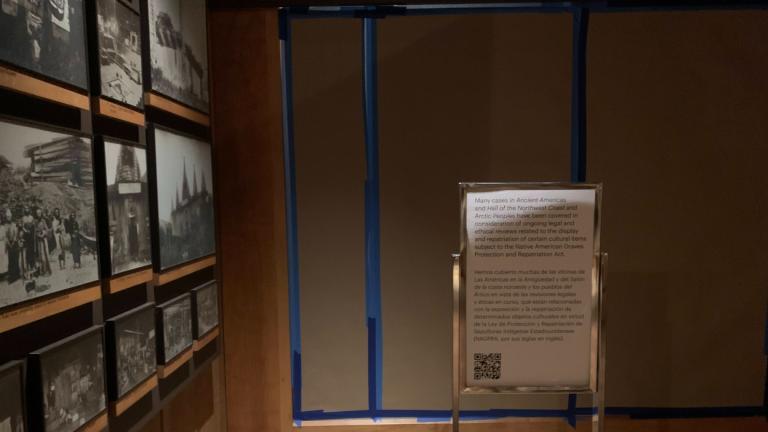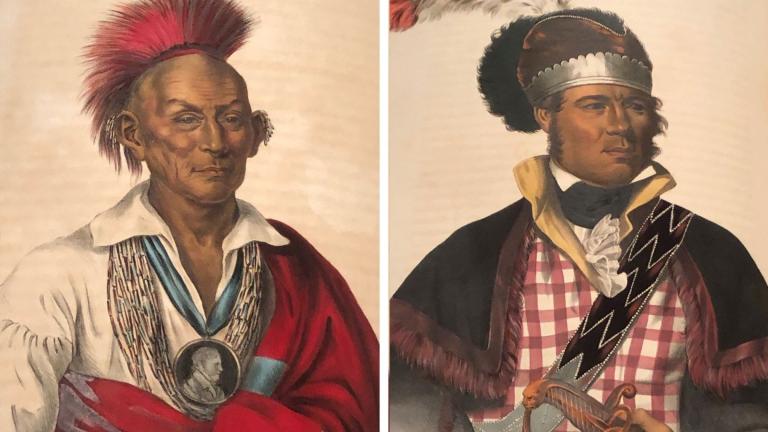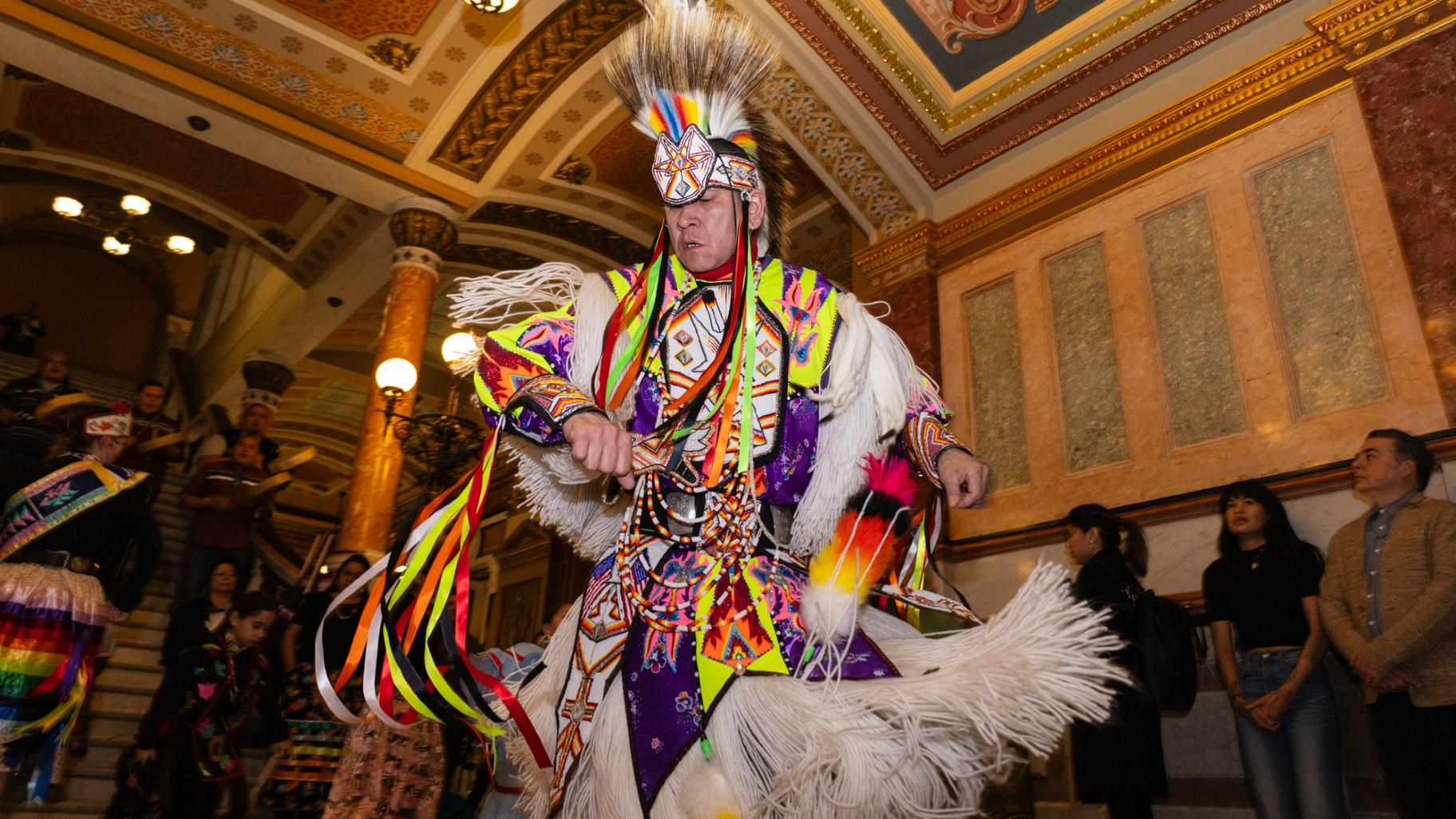 Ronnie Preston dances in the Illinois Capitol in February 2024 as part of the Native American Summit organized by the Chicago American Indian Community Collaborative. (Andrew Adams / Capitol News Illinois)
Ronnie Preston dances in the Illinois Capitol in February 2024 as part of the Native American Summit organized by the Chicago American Indian Community Collaborative. (Andrew Adams / Capitol News Illinois)
SPRINGFIELD – Illinois currently has no federally recognized tribal land within its borders, but that could change in the coming months.
A bill pending in the General Assembly this year would give back roughly 1,500 acres of park land in DeKalb County to the Prairie Band Potawatomi Nation. That tribe once occupied much of the Great Lakes region but was forcibly removed in the 19th century and is now headquartered in northeast Kansas.
“The Prairie Band Potawatomi Nation is grateful, and after 170 years, we may finally be on the path to getting this issue resolved,” tribal chairman Joseph “Zeke” Rupnick said during a recent Statehouse news conference.
The land in question makes up what is now Shabbona Lake State Park, located about 30 miles west of Aurora on U.S. Highway 30. The park is named after Chief Shab-eh-nay of the Prairie Band Potawatomi, a direct ancestor of Rupnick.
As Rupnick tells the history, the land that now makes up the park was set aside for Shab-eh-nay and his descendants in 1829 as part of the Treaty of Prairie du Chien. The following year, President Andrew Jackson signed the Indian Removal Act, which gave the president authority to grant land west of the Mississippi to Native Americans in exchange for giving up their tribal lands in the east.
In 1833, the Potawatomi signed the Treaty of Chicago in which they ceded nearly all their land along the western shore of Lake Michigan – all except the roughly two square miles reserved for them by the Treaty of Prairie du Chien.
From there, the Prairie Band Potawatomi splintered, with some moving to Canada and others moving west to Missouri and Kansas. In the 1840s, with money they received for ceding their land in Illinois, the Potawatomi bought a 30-by-30-mile reservation in Kansas, about 30 miles north of what is now Topeka.
But Chief Shab-eh-nay and about 20 to 30 other members of his extended family stayed behind on their land in Illinois. That is, until about 1850, when Shab-eh-nay took a trip west to check in with the rest of the tribe in Kansas to make sure they were settling in.
“Of course, you couldn't make that drive like you can in eight hours today,” Rupnick said in an interview.
Traveling by horseback or wagon, Rupnick said, Shab-eh-nay was gone from Illinois for several weeks.
“Once he got back here (to Illinois), that's when he discovered that people were living in his house,” Rupnick said. “They actually picked up his house and moved it to another location, and people were living in it. He tried to fight that through the court systems. They told him that he had abandoned his land, that the General Land Office had sold all of his land because he abandoned it. And they allowed the settlers and whoever else to live there.”
In the 170 years since that event, the Prairie Band Potawatomi have had no official presence in Illinois, but they now hope to reassert their claims.
Joseph “Zeke” Rupnick, tribal chairman of the Prairie Band Potawatomi Nation, speaks at a news conference at the Illinois Capitol in February 2024. (Peter Hancock / Capitol News Illinois)
In recent years, Rupnick said, the tribe has purchased 128 acres and two homes on the original reservation, and they are seeking to acquire the rest of the property through a combination of state and federal legislation.
In the General Assembly, House Bill 4718, by Rep. Mark Walker, D-Arlington Heights, would give them title to property currently occupied by Shabbona Lake State Park, much of which covers the tribe’s original reservation. But other parts of the reservation are now occupied by private homes, the titles to which Rupnick says are clouded due to the treaty disputes.
“Right now, if you did a title search, and you had a house that was within the boundaries of that reservation, that title search would come back and say that sale is subject to the concurrence of Shab-eh-nay and/or his descendants,” he said.
To clear up those claims, Rupnick said, the tribe has proposed federal legislation that would allow the current occupants of those homes to keep those properties, and even to pass them on to their descendants. But if those homeowners ever choose to sell their property, the federal legislation would give the tribe a right of first refusal to purchase it.
That legislation is being cosponsored by U.S. Sens. Dick Durbin, D-Illinois, and Jerry Moran, R-Kansas, but so far has not received any traction.
Just what the tribe intends to do with the land if it’s successful in reacquiring it remains an open question. In Kansas, the tribe owns and operates a successful hotel and casino operation, but Rupnick said such a plan is not currently under consideration in Illinois.
“We get asked that question quite a bit,” he said, “because 30 years ago, when we were trying to settle this land issue, there wasn't much gaming in Illinois. Now, I think the market is oversaturated.”
“Our first priority is to secure the land,” he added. “And that has always been the priority since I've been elected, to make sure that we have the land issue settled. Once that happens, then we can look at other options.”
Capitol News Illinois is a nonprofit, nonpartisan news service covering state government. It is distributed to hundreds of newspapers, radio and TV stations statewide. It is funded primarily by the Illinois Press Foundation and the Robert R. McCormick Foundation, along with major contributions from the Illinois Broadcasters Foundation and Southern Illinois Editorial Association.

